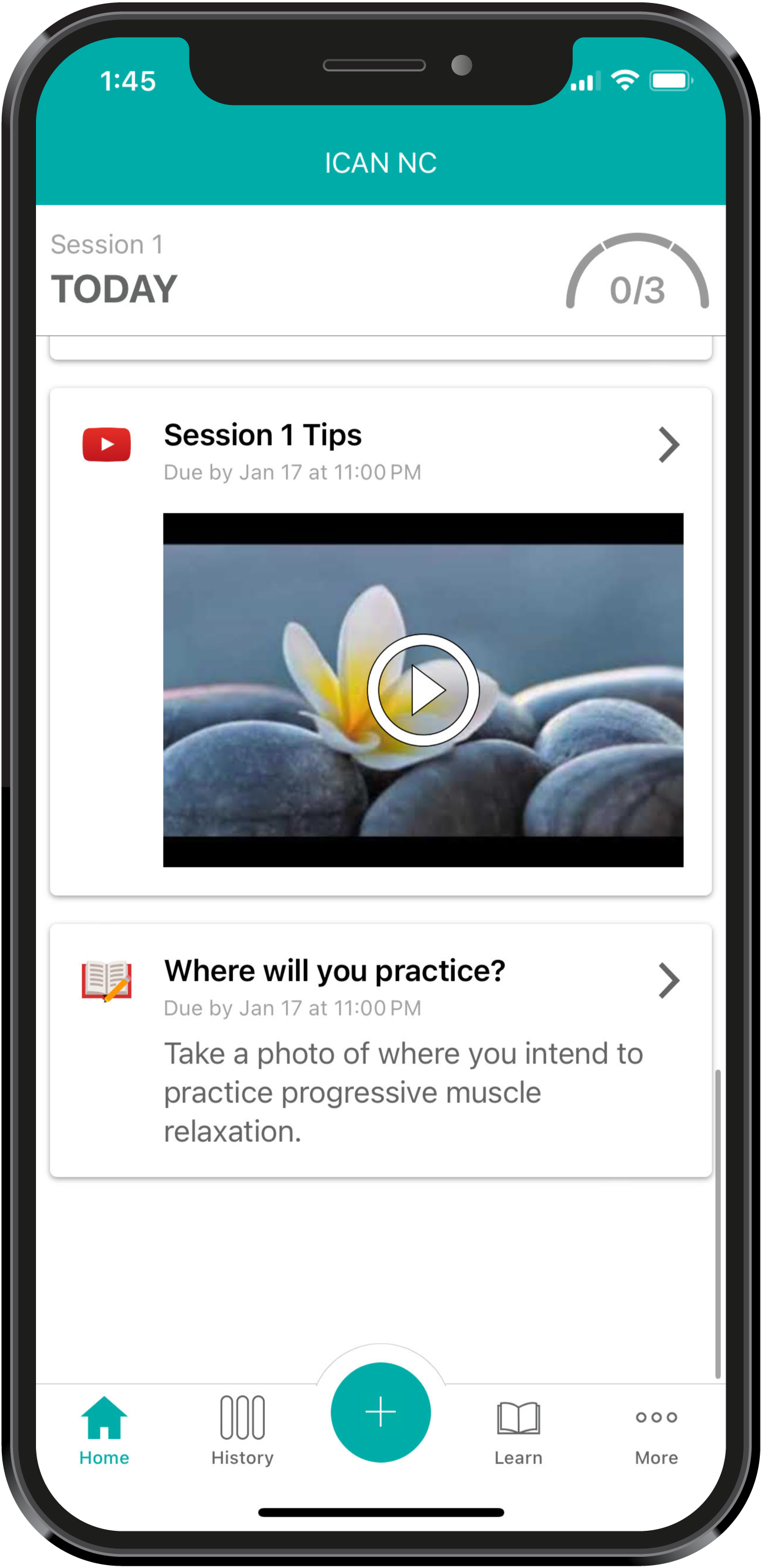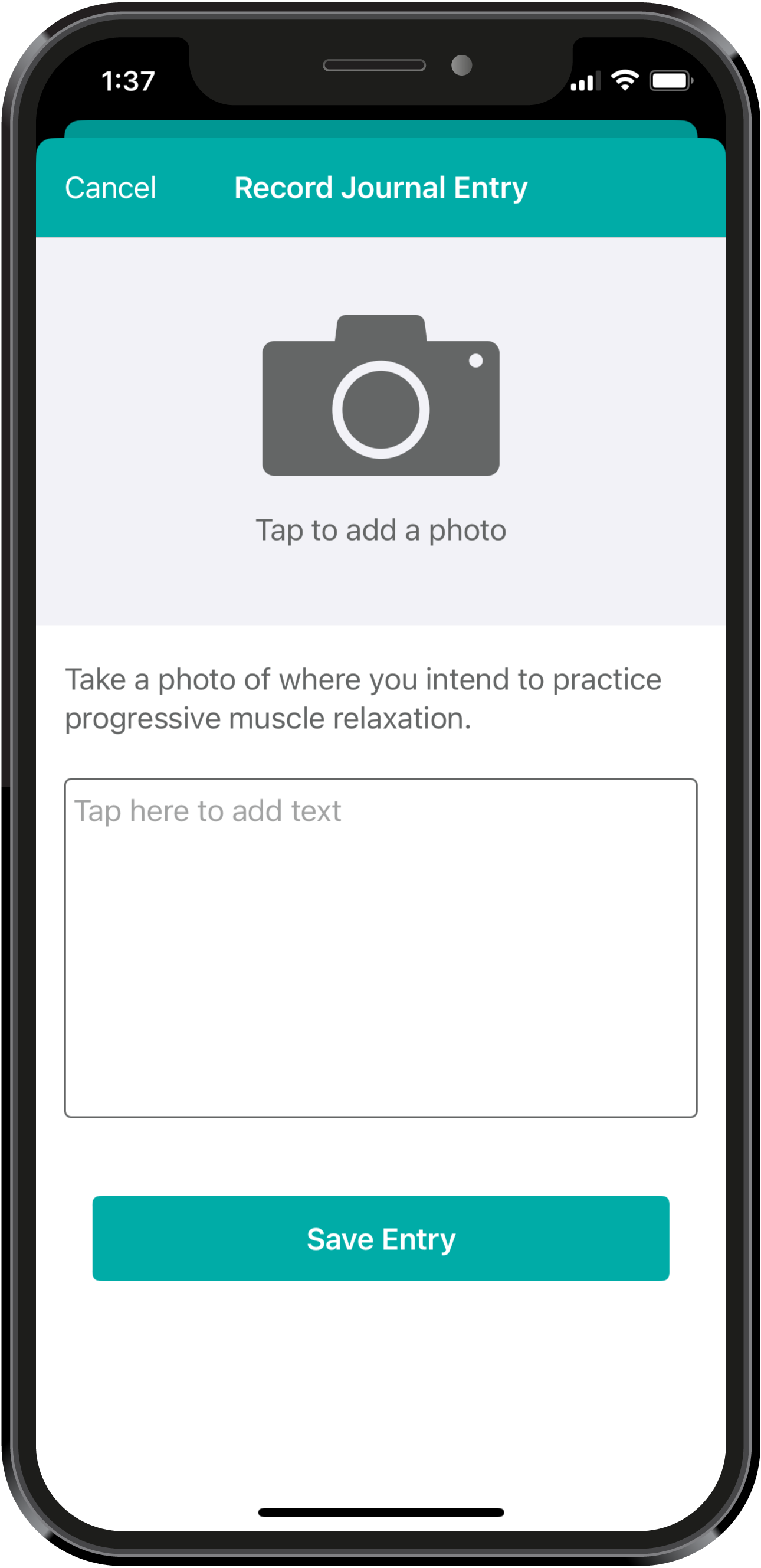The ICAN-NC study is evaluating the efficacy of remote therapy sessions and a supplemental app for breast cancer patients in rural areas. The digital health intervention, powered by Pattern, provides participants with symptom tracking and cognitive behavioral coping tools to help reduce pain, fatigue, and distress.

Research Title:
mHealth Behavioral Cancer Pain Intervention for Medically Underserved Patients (ICAN-NC)
Clinicaltrials.gov ID:
NCT04175639
Principle Investigator:
Tamara Somers, PhD
Clinical Psychologist and Associate Professor in the Department of Psychiatry and Behavioral Sciences at Duke University
Study Format:
Randomized Controlled Trial (RCT)
Multi-clinic (8 sites)
Enrollment:
180 participants
— EXECUTIVE SUMMARY —
Introduction: The ICAN-NC study objective is to demonstrate the efficacy of an innovative mobile health Pain Coping Skills Training (mPCST-Community) designed to meet the needs of breast cancer patients with pain in medically underserved areas.
Why Pattern: The study team needed a solution that could engage and retain participants, deliver impactful digital health interventions, and operate within their grant-funded budget. Pattern’s platform and supporting services were a perfect fit for ICAN-NC and their other related studies, including Step Up, mCope, and PainPac. The study team selected Pattern as their platform solution because of Pattern’s high user retention & satisfaction, rapid implementation, efficiency, and subject matter expertise.
Method: The ICAN-NC study is deployed across 8 rural clinics, seeking a total of 180 participants. The ICAN-NC study provides breast cancer patients in rural areas with access to remote therapy sessions and a supplemental app that provides participants with symptom tracking and cognitive behavioral coping tools to help reduce pain, fatigue, and distress. Pattern worked closely with the study team to develop the mPCST-Community intervention on its platform. The intervention included televisits, educational content including videos and PDFs, journaling, tracking of “pleasant activities”, patient-reported outcome (PRO) measures, and more.
Download the Full PDF
— INTRODUCTION —
Over recent years, digital health interventions, also referred to as mobile health (mHealth) interventions, have demonstrated efficacy for pain management, offering a viable alternative or companion to typical drug therapies.
“ICAN-NC is one of the first studies to evaluate the use of digital health interventions for underserved breast cancer patients. We have seen strong preliminary data and are optimistic that our intervention can increase access to care and reduce pain-related suffering in this patient population.”
– Tamara Somers, PhD
“The long-term goal of this work is to use mHealth technologies to facilitate wide-spread implementation of an efficacious behavioral cancer pain intervention – a non-pharmacological approach to pain management. The proposed project’s objective is to demonstrate the efficacy of an innovative mobile health Pain Coping Skills Training (mPCST-Community) designed to meet the needs of breast cancer patients with pain in medically underserved areas.” (NCT04175639)
— WHY PATTERN —
Pattern’s platform and supporting services were a perfect fit for the Duke team that needed a solution to engage and retain participants, deliver impactful digital health interventions, and operate within their grant-funded budget. The study team selected Pattern as their solution because of Pattern’s
- High Retention & User Satisfaction – Pattern offers intuitive interfaces that patients and study teams love, reducing the burden for everyone involved.
- Rapid Implementation – Pattern’s no-code configuration tools and full-service implementation experts deliver custom experiences incredibly fast.
- Efficiency – Pattern’s easy-to-use technology expedites study setup, data collection, digital health intervention development, and site activation. The platform includes support for automated workflows and content libraries that can be leveraged across multiple studies.
- Subject Matter Expertise – Pattern incorporates best practices honed from supporting 800K+ end users and 60+ studies across leading research institutions.
- Unified Research & Intervention Capabilities – Pattern’s unique solution combines a pharmaceutical-grade research platform with powerful no-code tools to quickly create, deploy, and study digital health interventions.
Principal Investigator Tamara Somers, PhD, and collaborators Sarah Kelleher, PhD and Hannah Fisher, PhD, faculty members of Duke University’s Psychiatry and Behavioral Sciences department, have a long history of partnership with Pattern Health. Pattern has powered multiple studies and digital health interventions for the researchers, including Step Up, mCope, and PainPac. All of these initiatives, including ICAN-NC, are rooted in delivering alternative pain management tools to various patient demographics.
“Pattern was the obvious choice for ICAN following the success of our previous collaborations. We enjoy working with Pattern because they have deep expertise supporting randomized controlled trials and digital health interventions, and they speak our language. Pattern’s configurable platform is key to helping us move quickly with multiple complex studies.”
– Tamara Somers, PhD
— METHOD —
 “Guided by strong preliminary data, a randomized controlled trial will be used to pursue three specific aims: 1) Test the extent to which the mPCST-Community intervention reduces pain, fatigue, disability, and distress, 2) Examine self-efficacy and pain catastrophizing as mediators through which the mPCST-Community leads to reductions in pain, fatigue, disability, and distress, and 3) To evaluate the cost-effectiveness of mPCST-Community.” (NCT04175639)
“Guided by strong preliminary data, a randomized controlled trial will be used to pursue three specific aims: 1) Test the extent to which the mPCST-Community intervention reduces pain, fatigue, disability, and distress, 2) Examine self-efficacy and pain catastrophizing as mediators through which the mPCST-Community leads to reductions in pain, fatigue, disability, and distress, and 3) To evaluate the cost-effectiveness of mPCST-Community.” (NCT04175639)
The ICAN-NC study is deployed across 8 rural clinics, seeking a total of 180 participants. While there was uncertainty about participants’ willingness to use app technology, participant recruitment has exceeded expectations to this point. The ICAN-NC study provides breast cancer patients in rural areas with access to remote therapy sessions and a supplemental app (mPCST-Community) that provides participants with weekly well-being tracking and mindfulness tools to help reduce pain, fatigue, and distress.
Pattern worked closely with the study team to develop the mPCST-Community intervention on its platform. Pattern used a structured project management process to understand requirements, collect feedback, and execute on time. The resulting patient experience is easily accessible on Android and iOS devices through the Pattern Health app. The mPCST-Community intervention includes televisits, educational content including videos and PDFs, journaling, tracking of “pleasant activities”, patient-reported outcome (PRO) measures, and more.
The accompanying Study Manager solution made it easy for the ICAN-NC team to manage their patients and track data. The study team used Pattern’s Study Manager to personalize patient content based on their latest appointment, track patient engagement, and send surveys.
“I see many participants in the ICAN-NC study. Participants enjoy the app and find it easy to use. They like having everything in one place where it is easy to find and navigate. In general, feedback is positive, and we see high rates of usage, which directly translates to retention and protocol adherence.”
– Hannah Fisher, PhD

Pattern Health powers clinical trials and digital interventions for many of the world’s leading academic researchers, CROs, and life science organizations. Our platform offers a wide range of features that help researchers collect data and engage participants. Our unique combination of no-code configuration tools, integration capabilities, supporting services, and catalog of clinical outcomes assessments enable high-quality and efficient research.
Looking for a technology partner to power your research? Let’s Talk.
About Principal Investigator Tamara Somers, PhD

Tamara J. Somers, PhD, is a Clinical Psychologist and Associate Professor in the Department of Psychiatry and Behavioral Sciences. Dr. Somers conducts research developing, testing, and implementing behavioral interventions for pain and other symptoms in patients with chronic disease (e.g., cancer, arthritis). She is particularly interested in developing behavioral interventions that are personalized to the needs of individual patients and using innovative delivery methods to deliver the interventions. Grant awards from the NIH, American Cancer Society, and other funding agencies support her research.
About Sarah Kelleher, PhD

Sarah A. Kelleher, PhD is a Clinical Psychologist and Assistant Professor in the Department of Psychiatry and Behavioral Sciences at Duke University Medical Center. Dr. Kelleher is a member of the Duke Pain Prevention and Treatment Research Program and the Duke Cancer Control and Population Sciences Program. Her research focuses on developing, testing, and implementing behavioral symptom management interventions for patients with chronic disease.
About Hannah Fisher, PhD

Download the Full PDF